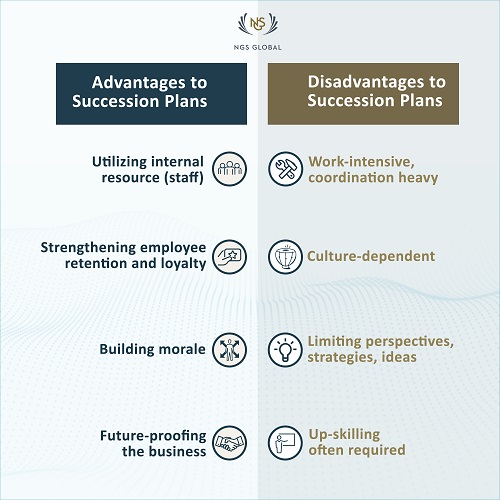Organizations embrace a mixture of internal promotion and external hiring when vacancies arise. Yet is there a perfect balance for both strategies, and how should they be tied into a broader company succession plan?
An increasing number of companies are embracing succession planning, defined as an organizational program which aims to keep talent in their pipeline by developing current employees to meet future business needs. The Society for Human Resource Management importantly notes that succession planning is a process of preparation, not pre-selection, for future job openings.
In a recent survey by the Association of Talent Development, most organizations are engaged in the practice, and of the ones that are not, 60% plan to do so in the near future. These numbers are significantly higher compared to when the survey was last conducted in 2018.
The use of succession plans has increased due to the tightness of the candidate market, the need for business continuity within an ongoing context of economic uncertainty, and the greater ability of tech solutions able to support HR executives with staff retention and development programs.

For senior and executive level hires, companies frequently feel a comfort factor when considering an internal candidate since they are dealing with a ‘known quantity.’ An accurate assessment of past performance within the company and the candidate’s overall capabilities is critically important, particularly when the candidate is being promoted into a new role with new responsibilities, as they may not have all the required skills.
In contrast, the company will have no experience with an outside candidate, so they may not feel entirely comfortable with their ability to perform. Often when evaluating an outside candidate, a client is looking for an executive who has done the role before. Forensic due diligence with regards to a rigorous candidate assessment, background and reference checking, culture fit, etc. can assuage these concerns.
Benefits to Succession Plans
Firms that make the commitment to proactively mine and develop talent ‘hidden’ in their organization will be at a competitive advantage, since they are tapping into an off balance-sheet asset hiding in plain sight.
Employees also benefit – their company is invested in their career journey and progression pathway, in a structured and tailored manner. When enabled most effectively, this increases morale amongst staff, and creates a company-wide shared sense of vision and purpose. Moreover, it increases retention rates – a highly valuable metric within the context of low unemployment and a highly candidate-centric jobs market.
A clear development and succession pathway for staff also has the added advantage of future-proofing a business. Companies that had this in place were better equipped to deal with the wave of resignations caused by the pandemic.
Drawbacks to Succession Plans
Whilst cultivating and promoting talent from within the company has huge upsides, taking this approach for all hires (and in particular, all senior hires) is work-intensive, culture-dependent and can result in groupthink.
It is work-intensive because it takes considerable resources to run effective succession plans. Critical development pathway programs such as shadow working, stretch assignments, and mentoring only work with a high degree of both coordination and mutual understanding between the learning and development team, the department involved, and the mentor/mentee. This may just not be practical in all parts of the business. Its success will also be largely dependent on how transparent and open the company culture is.
Perhaps more importantly, however, succession plans can be limiting, as they often fail to bring in new perspectives, ideas, and strategies that a targeted, external due diligence search process can provide. Such an undertaking will bring in seasoned, external leaders who will broaden the organization’s perspective. Under certain circumstances, such as rapid growth, new business lines, and where there is a clear shortage of experience and leadership, external hiring should be utilized.
Advice for Organizations
There is no magic ratio, but it is important to balance internal morale with the need to transform certain business lines, and build/maintain a competitive advantage (particularly if you are a private sector company).
A properly run search process should also bring detailed insight into the competitive landscape, and provide confidence in your own internal talent pool, or alert you to significant gaps between your executives and your external competitors.
It is also often very useful to include internal candidates within any external hiring process as a benchmarking exercise.
Providing continuous education to the people in any talent pool is another way to forge an employee development pathway. Encouraging staff to participate in relevant courses and programs, and paying for their participation, can be a key succession tool that helps boost morale, build loyalty, and develop that talent faster. Some companies even provide full or partial financial support to take MBAs and other masters programs.
As a suggested strategy, each business line should have a good mix of external and internal managers to maximize both cultural cohesion and a diversity of perspectives.









